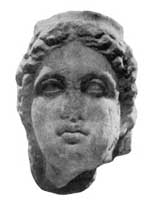 Chersonesos
Chersonesos
I noticed that this month's History Today featured an article about the ancient city of Chersonesos near Sebastopol in the Ukraine. It was referred to as the Ukrainian Pompeii so I was naturally interested in learning more. I found the official site of the National Preserve of Tauric Chersonesos and it included an extensive history of the city and its interaction with the Roman Empire.
"After Rome subdued the kingdom of Mithradates VI Eupator, Chersonesos found itself subordinate to Bosporos and remained so until Julius Caesar granted the city its eleutheria (freedom). A Chersonesan decree in honor of Gaius Julius Satirus, an ambassador to Julius Caesar, indicates that Chersonesos received its independence in 46-45 BC. After Caesar's death the Bosporan king Asandros attempted to subordinate Chersonesos once again, but the city successfully retained its independence. Around 25-24 BC Augustus normalized relations between the Chersonesan civil community and the Bosporan dynasts. Under the initiative of the Roman administration, Bosporos and Chersonesos created a defensive union which existed until war broke out between Rome and Bosporos. Chersonesos joined the side of Rome during the war, after which Chersonesos was granted certain privileges. The Roman administration became responsible for defending the city from the barbarian tribes. In the mid-60s AD the legate of the Roman province of Moesia, Tiberius Plautius Silvanus, aided Chersonesos in defeating the barbarians who were threatening the city. After these events the Roman authorities started to intervene in the internal politics of Chersonesos more forcefully, a circumstance which was reflected in the issue of coinage. Evidence which attests to the city's growing dependence on Rome during the Flavian dynasty includes the appearance in Chersonesos of statues of the Roman governors of Moesia, and the custom of granting the Chersonesan aristocracy Roman citizenship, a practice reserved for those regions outside the Roman empire which would soon become Roman provinces."
No comments:
Post a Comment